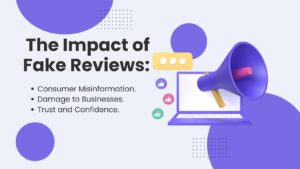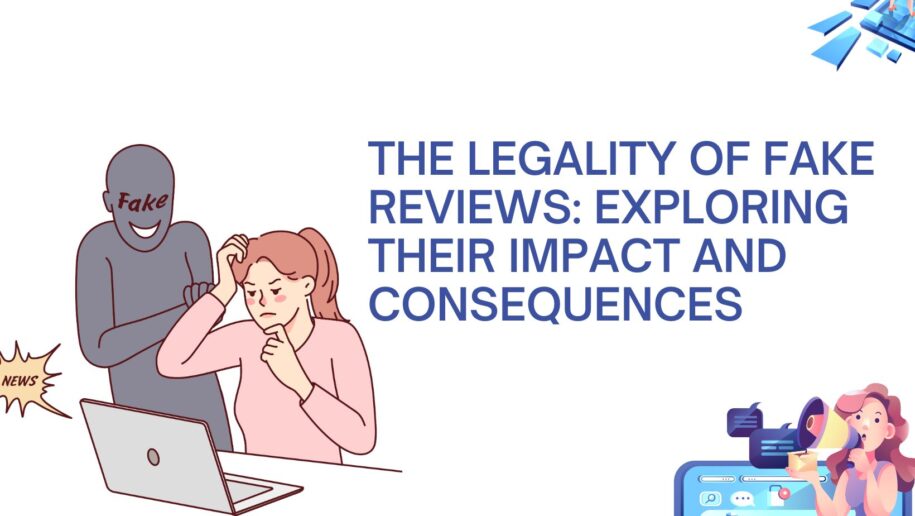In an increasingly digital world, online reviews hold significant influence over consumer decision-making. However, the prevalence of fake reviews raises concerns about their legality. Are fake reviews illegal? This article delves into the legal implications of fake reviews, examining the potential consequences for both businesses and individuals involved in such practices. Understanding the legal landscape surrounding fake reviews is essential for maintaining trust and integrity in the online marketplace.
Understanding Fake Reviews
It can be defined as fabricated or misleading feedback about a product, service, or business that is posted online. These reviews are often created with the intention of manipulating consumer perception or gaining an unfair advantage over competitors. The ease of posting anonymously on various platforms has contributed to the increasing prevalence of fake reviews.
The Impact of Fake Reviews
It have several negative consequences for both consumers and businesses. Firstly, they erode consumer trust by providing false information, leading to misguided purchasing decisions. Consumers rely on reviews to make informed choices, and fake reviews deceive them, resulting in disappointment and potential financial loss. Secondly, businesses can suffer reputational damage when fake reviews are aimed at tarnishing their image. This can lead to a loss of customers and revenue. Lastly, fake positive reviews can distort market competition, giving dishonest businesses an unfair advantage over their genuine counterparts.

The Impact of Fake Reviews:
- Consumer Misinformation:
- Fake reviews can mislead consumers into making uninformed decisions.
- They may distort product or service ratings, leading to a skewed perception of quality.
- Consumers may end up purchasing subpar products or services based on false information.
- Damage to Businesses:
- Fake reviews can harm the reputation and credibility of businesses.
- Competitors or disgruntled individuals may post negative reviews to tarnish a company’s image.
- Small businesses, in particular, can suffer significant financial losses as a result of Illegal reviews.
- Trust and Confidence:
- The prevalence of Illegal reviews erodes trust in online review platforms.
- Consumers may become skeptical and hesitant to rely on reviews for decision-making.
- Genuine positive reviews may be viewed with suspicion, undermining the overall effectiveness of the system.
Legal Implications of Fake Reviews
The legality of fake reviews varies across jurisdictions, but they often fall under existing laws and regulations. Consumer protection laws in many countries prohibit false or deceptive advertising, and it can be considered a form of deceptive practice. Fraudulent misrepresentation is another legal implication, as Illegal reviews deceive consumers into believing they are genuine feedback from real customers. Additionally, fake reviews that involve trademarks, copyrights, or other intellectual property may violate intellectual property laws. Lastly, if a fake review includes false and damaging statements about an individual or business, it may constitute defamation and could lead to legal consequences.
The Legal Consequences:
- Consumer Protection Laws:
- Many countries have consumer protection laws in place to safeguard consumers from deceptive practices.
- Posting fake reviews can be considered false advertising or fraud, violating these laws.
- Consumers who have been misled by fake reviews may have legal recourse to seek compensation or refunds.
- Intellectual Property Infringement:
- In some cases, Illegal reviews may involve the unauthorized use of trademarks or copyrighted material.
- Using a business’s logo or copyrighted content without permission can lead to legal consequences.
- Businesses can take legal action against individuals or entities responsible for using their intellectual property in Illegal reviews.
- Platform Policies and Terms of Service:
- Online review platforms typically have policies and terms of service that prohibit fake reviews.
- Violating these policies can result in penalties, including removal of reviews or suspension of accounts.
- Platforms may also cooperate with legal authorities to identify and prosecute individuals engaged in review fraud.
- Defamation and Libel:
- If Illegal reviews contain false statements that harm a business’s reputation, it may qualify as defamation or libel.
- Businesses can pursue legal action against individuals spreading false information through Illegal reviews.
- Defamation laws vary across jurisdictions, but in many cases, proving the false nature of the reviews is crucial to successful litigation.
Legal Actions Against Fake Reviews
Government regulatory agencies, such as the Federal Trade Commission (FTC) in the United States, have taken action against businesses involved in fake review practices. These agencies have the power to impose fines and penalties on violators. Furthermore, affected individuals and businesses have the option to pursue legal action against the perpetrators, seeking compensation for damages incurred. Online platforms and review websites also play a role in combating fake reviews by implementing policies that prohibit such practices and employing mechanisms to detect and remove fraudulent content.
Challenges in Combating Fake Reviews
Combating Illegal reviews presents several challenges. The anonymous nature of the internet makes it difficult to trace the origin of fake review, making it challenging to hold the responsible parties accountable. Jurisdictional complexities arise when Illegal reviews originate from different countries with varying laws and regulations. Moreover, identifying fake reviews among the vast volume of online content requires advanced algorithms and machine learning technologies, which are not foolproof.
Recommendations for Consumers and Businesses
Consumers can protect themselves from fake reviews by approaching online reviews with caution. It is essential to consider multiple sources of information, evaluate the overall consensus, and look for patterns in reviews before making purchasing decisions. If consumers suspect a fake review, they should report it to the relevant platform or regulatory authority, contributing to the fight against fraudulent practices. On the other hand, businesses should focus on delivering quality products and services. Encouraging genuine customer feedback and avoiding the temptation of fake reviews will help build trust with consumers.
Conclusion
While the legality of fake reviews varies across jurisdictions, they often fall under existing consumer protection, fraud, intellectual property, and defamation laws. Legal actions can be taken against those involved in fake review practices, and regulatory bodies have started cracking down on such activities. Nevertheless, combating Illegal reviews presents challenges due to the anonymous nature of the internet, jurisdictional complexities, and the difficulty of detecting fraudulent content. Consumers should approach online reviews with caution, and businesses should prioritize transparency and genuine customer feedback to foster a trustworthy and reliable online review ecosystem.

